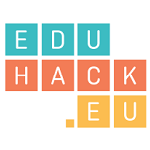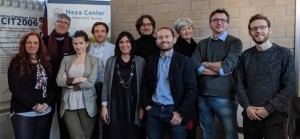Project EduHack

Hacking Education through E-learning and Open Education
Within Higher Education, the emergence of Massively Online Open Courses (MOOCs) and other blended methodologies is vastly increasing the demand for digital training opportunities. Still, Europe is suffering from a lack of teachers with the appropriate skills to design and develop digital educational resources, and/or run ICT-enabled educational courses. These skills include not only a level of technical competence and knowledge of educational technologies, but also the ability to coordinate multi-disciplinary teams in the realisation of course-development activities.
EduHack, an initiative supported by the Erasmus + Programme of the European Union, is developing a capacity building methodology that utilises online courseware and EduHackathons, whereby teaching professionals will learn how to produce digitally-supported learning experiences and will have the opportunity to experiment with creative models and approaches to teaching and learning, with a focus on fostering collaborative learning and student engagement.
The delivery of the EduHack course will follow an active approach, putting into practice the key principles of the educational paradigms covered as part of its content: networked and connected learning, participatory cultures, hybrid pedagogy and Open Education. Throughout the programme, participants will create digital artefacts of different kinds and will develop a rich personal teaching-learning environment on the open web. Teachers’ own web spaces will be a very tangible output that will operate as an open portfolio gathering more granular resources.
The starting point of the project is that, in order to be able to meaningfully teach in an open and networked world, teachers need not only to “learn” how to teach with technology, but actually to “experiment” new ways of teaching, since only getting immersed in a “open end networked teaching” experience they can appreciate the change ahead of them and the opportunities that this change is bringing.
The EduHack project aims to contribute to tackle this problem in a very innovative way, by:
- Developing a methodology for a teachers’ hackaton, whereby young teaching professionals will learn the knowledge and skills necessary for online course creation and delivery.
- Organise 3 instances of these hackathons around Europe, in which participants will learn the skills, and create prototype courses, which could be further developed after the end of the project.
- Set up a European resource database and network, which would promote the reproduction of these events by new institutions and in new countries.
The organisation of the hackathons will draw upon methodologies for such events in other fields created by industry-leaders, including Y-Combinator startup accelerators, and the TEDx network for independently organised TED events.
By the end of the project, EduHack will equip at least 90 teachers from 30 different institutions, to design and deliver their own e-learning courses – with their competence being proven through the development of a prototype course during the project’s course.
Partners: Nexa Centre of the Politecnico di Torino (Italy), Universidad Internacional de La Rioja (Spain), Coventry University (UK), ATiT BVBA (Belgium), Knowledge Innovation Centre (Malta).
Further information and outcomes:
Reference: 2017-1-IT02-KA203-036854
Time span: 2017-2020
Funding type: European public


